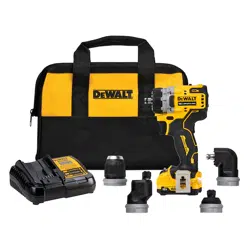Loading ...
Loading ...
Loading ...

ENGLISH
6
READ ALL INSTRUCTIONS
Important Safety Instructions for All
Battery Packs
WARNING: Read all safety warnings, instructions,
and cautionary markings for the battery pack,
charger and product. Failure to follow the
BATTERIES AND CHARGERS
The battery pack is not fully charged out of the carton.
Before using the battery pack and charger, read the
safety instructions below and then follow charging
proceduresoutlined. When ordering replacement battery
packs, be sure to include the catalog number andvoltage.
The label on your tool may include the following symbols. The
symbols and their definitions are asfollows:
V ......................... volts
Hz .......................hertz
min ..................... minutes
or DC ......direct current
...................... Class I Construction
(grounded)
…/min ..............per minute
BPM .................... beats per minute
IPM ..................... impacts per minute
OPM .................... oscillations per
minute
RPM .................... revolutions per
minute
sfpm ................... surface feet per
minute
SPM .................... strokes per minute
A ......................... amperes
W ........................watts
Wh ......................watt hours
Ah ....................... amp hours
or AC ...........alternating current
or AC/DC .... alternating or direct
current
...................... Class II Construction
(double insulated)
n
o
.......................no load speed
n .........................rated speed
......................earthing terminal
.....................safety alert symbol
.....................visible radiation
..................... wear respiratory
protection
..................... wear eye protection
..................... wear hearing
protection
..................... read all
documentation
• Wear protective clothing and wash exposed areas
with soap and water. Allowing dust to get into your
mouth, eyes, or lay on the skin may promote absorption
of harmfulchemicals. Direct particles away from face
andbody.
• Use the appropriate dust extractor vacuum to remove
the vast majority of static and airborne dust. Failure
to remove static and airborne dust could contaminate the
working environment or pose an increased health risk to
the operator and those in closeproximity.
• Use clamps or other practical ways to secure and
support the workpiece to a stable platform. Holding
the work by hand or against your body is unstable and may
lead to loss ofcontrol andinjury.
• Air vents often cover moving parts and should be
avoided. Loose clothes, jewelry or long hair can be caught
in movingparts.
CAUTION: When not in use, place tool on its side
on a stable surface where it will not cause a
tripping or falling hazard. Some tools with large
battery packs will stand upright on the battery pack
but may be easily knockedover.
Additional Safety Information
WARNING: Never modify the power tool or any part of
it. Damage or personal injury couldresult.
WARNING: ALWAYS use safety glasses. Everyday
eyeglasses are NOT safety glasses. Also use face or
dust mask if cutting operation is dusty. ALWAYS WEAR
CERTIFIED SAFETYEQUIPMENT:
• ANSI Z87.1 eye protection (CAN/CSA Z94.3),
• ANSI S12.6 (S3.19) hearing protection,
• NIOSH/OSHA/MSHA respiratoryprotection.
WARNING:
Some dust created by power sanding,
sawing, grinding, drilling, and other construction
activities contains chemicals known to the State
of California to cause cancer, birth defects or
other reproductive harm. Some examples of these
chemicalsare:
• lead from lead‑based paints,
• crystalline silica from bricks and cement and other
masonry products, and
• arsenic and chromium from
chemically‑treatedlumber.
Your risk from these exposures varies, depending on
how often you do this type of work. To reduce your
exposure to these chemicals: work in a well ventilated
area, and work with approved safety equipment, such
as those dust masks that are specially designed to filter
out microscopicparticles.
the work by hand or against your body leaves it unstable
and may lead to loss ofcontrol.
• Wear safety goggles or other eye protection.
Hammering and drilling operations cause chips to fly.
Flying particles can cause permanent eyedamage.
• Do not operate this tool for long periods of time.
Vibration caused by tool action may be harmful
to your hands and arms. Use gloves to provide extra
cushion and limit exposure by taking frequent restperiods.
• Drill bits may get hot during operation. Wear gloves
when touchingthem.
WARNING: Shock hazard. When drilling or driving into
walls, floors or wherever live electrical wires may be
encountered, DO NOT TOUCH ANY METAL PARTS OF
THE TOOL! Hold the tool only by the plastic handle(s) /
housing to prevent shock.
• Hold drill firmly with both hands to control the
twisting action of the drill. If your drill is equipped with a
side handle, always use the sidehandle.
WARNING: Drill may stall (if overloaded or improperly
used) causing a twist. Always expect the stall. Grip the
drill firmly to control the twisting action and prevent
loss of control which could cause personal injury. If a
stall does occur, release the trigger immediately and
determine the reason for the stall before re‑starting.
• Always remove the battery pack when attaching or
removing accessories. When attaching accessories in
the drill chuck, it is important to securely tighten the chuck
using all three holes to prevent slippage. When using a
keyless chuck, hand tightenfirmly.
Loading ...
Loading ...
Loading ...
